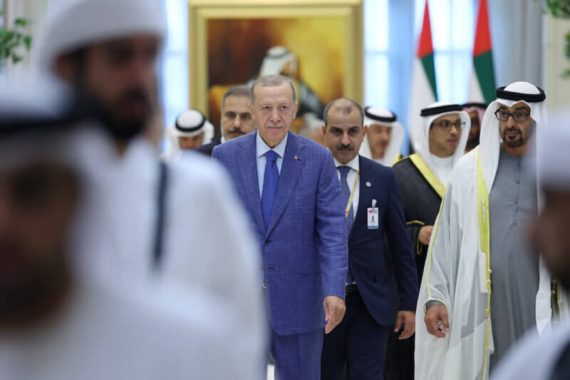Rekindling Bonds: A Momentous Journey of Diplomacy
The recent visit of the Turkish President Recep Tayyip Erdoğan to three prominent Gulf Cooperation Council (GCC) countries has captivated attention, illuminating the Turkey-Gulf relations and pointing towards a rekindling of the pre-Arab Uprising era in bilateral ties. On July 17, President Erdoğan embarked on a Gulf tour, encompassing Saudi Arabia, Qatar, and the United Arab Emirates (UAE), with an economy-oriented agenda to foster and fortify trade and investment relations with these influential Gulf nations.
Following the significance of President Erdoğan’s re-election on May 28, his visits hold special importance, with Gulf monarchies poised to form a cornerstone in Turkey’s foreign policy for the next five years. The Turkish elections garnered profound attention in the Gulf region, leading to swift and warm congratulations from Gulf leaders, underscoring their desire for continuity and stronger ties with Turkey. The GCC nations, in an unequivocal display of commitment, expressed their steadfast determination to bolster relations with Ankara throughout President Erdoğan’s forthcoming term, setting the stage for an era of promising collaboration and mutual growth.
The timing and significance of Erdoğan’s visit were of utmost importance, given Turkey’s ongoing efforts to revitalize its struggling economy, which has been grappling with currency devaluation, soaring inflation, and depleting reserves. The expectations back in Turkey regarding a potential trade and investment deal with Gulf monarchies were set high. Notably, Turkey’s new economy managers, Finance Minister Mehmet Şimşek and Central Bank Governor Hafize Gaye Erkan, preceded President Erdoğan’s visit with their arrival in Saudi Arabia on July 11. Their purpose was to lay the groundwork for the high-ranking Turkish delegation’s visit, further underscoring the importance of the occasion. Minister Şimşek, along with Turkish Vice President Cevdet Yilmaz, also embarked on visits to Qatar and the UAE to strengthen economic ties with these nations earlier in July.
Enhancing Bonds: Agreements, Gestures, and Gifts
Accompanied by 200 businesspeople, the Turkish President embarked on his first visit to Saudi Arabia, where he held a significant meeting with Saudi Crown Prince Muhammad bin Salman. The Saudi Arabia-Türkiye Business Forum took place in Jeddah on July 18, resulting in the signing of five key agreements between the two countries, covering investment, energy, communication, and defense industry cooperation.
Of notable importance among these agreements is the cooperation deal with Baykar Technology, which demands considerable attention. The partnership with the Saudi Ministry of Defense represents Turkey’s most substantial defense and aviation export agreement ever, as confirmed by Haluk Bayraktar, the CEO of Baykar Technologies. Beyond the scope of mere trade relations, these deals also encompass joint production and technology transfer. Baykar Technologies highlighted that the primary objective of this collaboration is to bolster the high-tech development capabilities of both nations in the foreseeable future.
Emphasizing the depth and significance of the collaboration, Baykar Technologies stated, “With this comprehensive agreement, there will be a focus on technology transfer and joint production to propel the high technology development capabilities of both countries.”
Following the business and diplomatic contacts in Saudi Arabia, President Erdoğan arrived in Qatar on the second leg of his Gulf tour. During an official ceremony at Lusail Palace, President Erdoğan met with his counterpart Emir of Qatar Sheikh Tamim bin Hamad al-Thani. During the visit, the two countries inked an MoU on the occasion of the 50thanniversary of diplomatic relations.
Throughout the last decade, Turkey has proven to be a reliable and unwavering partner for Qatar, a bond that became even more evident during the 2017 Gulf Crisis. Ankara swiftly and consistently extended its political, economic, and military backing to Qatar, solidifying their relationship as vital regional allies. Both nations hold significance for each other, serving as trusted and strategic foreign policy allies in the region.
In a joint statement both countries noted, “Türkiye-Qatar relations reflect deep-rooted historical ties built on political and social foundations, as evidenced by the fact that the two countries have consistently supported each other in the spirit of brotherhood and solidarity throughout many pivotal periods in their history, and the two countries continue to mutually support each other in various fields.” The two leaders are expected to meet again later this year at the 9th Qatari-Turkish Supreme Strategic Committee meeting slated to take place in Qatar.
The third and last stop of President Erdoğan’s Gulf tour was the UAE. In a two-day official visit, Turkey and the UAE signed 13 agreements in fields such as energy, transportation, infrastructure, logistics, e-commerce, finance, health, food, tourism, real estate, construction, defense industry, artificial intelligence, and advanced technologies. The total worth of agreements announced stands at $50.7 billion. The two countries also agreed on establishing a “High Level Strategic Council” to elevate the bilateral relations to the level of strategic partnership.
Apart from business deals, personal gestures and significant gifts have become remarkable features of President Erdoğan’s recent Gulf tour: President Erdoğan gifted a Togg, Turkey’s first domestically manufactured electric car, to each of the leaders of Saudi Arabia, Qatar, and the UAE. Media attention was high as President Erdoğan and Gulf leaders personally examined the car together. Apart from its importance domestically, it appears that the Togg might be a diplomatically significant tool in Erdoğan’s foreign policy over the upcoming five years.
During his official visit to the UAE, President Erdoğan was honored with the prestigious Order of Zayed by Emirates President Mohamed bin Zayed Al Nahyan (MBZ). The Order of Zayed, named after the UAE’s founding father, is the highest civilian honor bestowed upon world leaders and heads of state, symbolizing humanitarianism, international cooperation, and the pursuit of peace worldwide. The award of the Order of Zayed is as a goodwill gesture in strengthening bilateral relations between the UAE and Turkey.
Beyond the Horizon: Key Reflections and Future Trajectories
The primary dimension that will define the trajectory of Turkey-Gulf relations in the upcoming five years is undeniably its profoundly business-oriented nature. This strategic focus on bolstering economic ties has been eloquently emphasized by Nail Olpak, the president of the Foreign Economic Relations Board (DEİK). During this recent Gulf tour, which he aptly dubbed #businessdiplomacy, the profound developments and engagements with the Gulf monarchies have been unambiguously centered around forging robust business alliances and sealing consequential deals. It becomes evident that business collaborations are not merely a means to an end but, rather, they represent the very essence of the diplomatic engagements with these Gulf nations, underscoring the critical role they play in shaping the future of Turkey-Gulf relations.
Defense and energy cooperation stand out as the primary pillars of collaboration between Turkey and the Gulf. The agreements forged in these critical sectors hold the potential to pave the way for enduring and steadfast cooperation, owing to the remarkable synergy in supply and demand between Turkey and the GCC monarchies.
Within the energy domain, Turkey’s position as a net energy importer harmoniously corresponds to the pivotal role played by Gulf states as prominent energy exporters. The surging prominence of liquefied natural gas (LNG) in Turkey’s natural gas imports serves as a poignant testament to the indispensability of energy relations, particularly with Qatar. Moreover, Turkey’s allure as an attractive investment destination for renewable energy projects mirrors the ambitions of Gulf monarchies seeking to transition their economies beyond oil and achieve net-zero emissions. These converging factors underscore the mutual benefits and profound significance of fostering robust energy cooperation between Turkey and the Gulf countries.
Recommended
In the realm of defense, the Gulf nations are actively pursuing the diversification of their military partnerships and reinforcing their drone capabilities to counter unconventional attacks on oil facilities. At the same time, Turkey is keen on leveraging its advanced and cost-effective drone industry to reap both economic and strategic advantages. With these parallel objectives and shared interests, defense cooperation emerges as an immensely advantageous endeavor for both parties, promising mutual gains and strengthened security measures.
From a strategic perspective, defense sector productions and technologies serve as critical commodities that establish enduring dependencies between sellers and buyers. By forging defense ties, especially with technology transfer and joint production, with the Gulf monarchies, Turkey can effectively strengthen its presence and strategic importance in the Gulf region in a sustained and integrated manner. This proves particularly advantageous for the Gulf monarchies, as procuring Turkish defense productions and technologies, as a NATO member, is less likely to trigger significant backlash from the United States and Western partners, unlike military cooperation with China and Russia, which often raises concerns among these powers. Given the close alliance between the Gulf monarchies and the U.S., this advantage holds substantial weight.
Economically, the numbers speak for themselves: Turkey’s defense exports witnessed a remarkable 42% increase between 2020 and 2021, with the total export value reaching an impressive $4.4 billion in 2022. Notably, for prominent firm Baykar, foreign contracts constitute more than 90% of its revenue in this sector. Additionally, Turkey has set ambitious goals to achieve $6 billion worth of arms exports by 2023. Consequently, the Gulf states are ideally positioned to fill the trade and investment gap, thus providing crucial support to Turkey in reaching its economic objectives in this domain.
The strategic alignment of interests in these areas not only ensures mutual benefits, but also sets the stage for sustained, long-term partnerships, further solidifying the bond between Turkey and the Gulf nations providing that the political will and trust-building measures between both sides continues.





